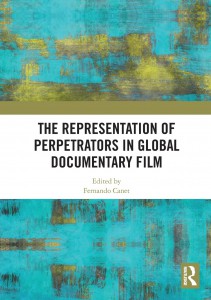The Representation of Perpetrators in Global Documentary Film
Sous la direction de Fernando Canet


Moyenne des votes : ![]()
| 0 | vote | |
| 0 | vote | |
| 0 | vote | |
| 0 | vote |
Votre vote : -
Description de l'ouvrage:
The present book aims to explore how the perpetrator of crimes against humanity is represented in recent documentary films in different sociocultural contexts around the world.
In recent years the number of diverse forms of cultural productions focused on the figure of perpetrator has increased significantly, thus eliciting a turn toward this problematic figure. The originality of these narratives lies in the shift in point of view they propose: their protagonists, rather than being the victims of the atrocities, are instead their perpetrators. A significant number of documentary films examining crimes against humanity from the perpetrators’ perspective have been released in the first two decades of this century. This current tendency together with the growing scholarly interest in the explorations of the perpetrator underscore the timeliness of the present book. It aims to explore how the perpetrator is represented in recent documentary films in different sociocultural contexts around the world. The perpetrator documentary films’ objects of study in this book are contextualized in the following contexts: Indonesian, Cambodian and Rwandan genocides, Chilean and Argentine dictatorship, Spanish Civil War and its aftermaths, Israeli-Palestinian conflict, Nazi legacy, South Africa Apartheid and USA's state perpetrations. Among others, the documentary films analysed are as follows: The Act of Killing, The Look of Silence, S-21: The Khmer Rouge Killing Machine, National Bird, Fahrenheit 11/9, Waltz with Bashir, Z32, El Pacto de Adriana, El Color del Camaleón, 70 y Pico, and El hijo del cazador.
The Representation of Perpetrators in Global Documentary Film will be a key resource for academics, researchers, and advanced students of Filmmaking, Communication Studies, Media Studies, Visual Studies, Cultural Studies, and Sociology. The chapters included in this book were originally published as a special issue of Continuum.
À propos de l'auteur :
Fernando Canet is Professor in Media and Communication Studies at the Fine Arts College at Universitat Politècnica de València, Spain. He has been Visiting Research fellow at Goldsmiths College, New York University, University of Kent, and Universitat Pompeu Fabra, and he enjoyed a stay under the Erasmus-STA program at the Università degli Studi di Parma, Italy.
Voir le site internet de l'éditeur Routledge
> Du même auteur :
> Sur un thème proche :
Beyond Bias (2021)
Conservative Media, Documentary Form, and the Politics of Hysteria
de Scott Krzych
Sujet : Genre > Documentary
Post-Revolution Nonfiction Film (2013)
Building the Soviet and Cuban Nations
Sujet : Genre > Documentary
Chavez (2009)
The Revolution Will Not Be Televised:A Case Study of Politics and the Media
de Rod Stoneman
Sujet : Genre > Documentary
The Rhetoric of the New Political Documentary (2008)
Dir. Thomas W. Benson et Brian J. Snee
Sujet : Genre > Documentary
Kartemquin Films (2024)
Documentaries on the Frontlines of Democracy
Challenging the Narrative (2023)
Documentary Film as Participatory Practice in Conflict Situations
Recording Memories from Political Violence (2010)
A Film-maker's Journey